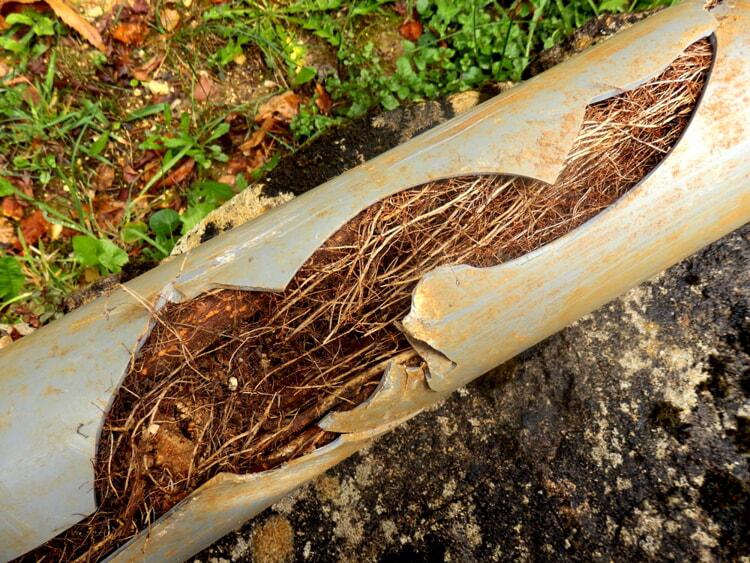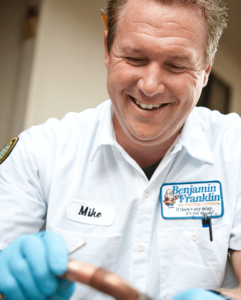10 Signs of a Broken Sewer Line
May 30, 2018
A broken sewer line is the last thing any homeowner wants to deal with. But, as with any plumbing issue, it happens! And although it may feel stressful in the moment, nothing is unfixable. At Ben Franklin, we’ve seen it all, and a sewer line repair is part of our job.

The first step in addressing a broken sewer line is identifying the issue. Here are some of the most common indicators of a sewer line issue:
- Sewer Odor
Usually, one of the first signs of a sewer line issue is an odor. Even though sewer gas can wind up in your home for other reasons—including a dried out drain in your basement floor—a strong sewer smell can be an indication of a sewer backup or broken line. That’s why it’s important to pay attention to any unusual smells and take them seriously.
The most common areas of the home for sewer odor is the basement. However, a sewer smell out in your yard may be an indication of a broken line in the property outside your home.
- Gurgling Toilet
Any unusual noise coming from the toilet is never a good sign. If your toilet makes a gurgling sound after you flush, it could be a sign of a broken sewer line. Gurgling is essentially just the sound of air being trapped and released, so hearing this sound is likely an indication that air is being introduced into your sewer line.
- Pests in Your Home
Because insects and rodents can travel through sewer lines, if they wind up inside your home, it could be a sign of a break in the line that pests can fit through and enter your home.
- Slow Drains
Of course isolated clogs are common in any home. But if you find that all the drains in your home seem clogged, it could be a sign of a broken sewer line. Especially if you find that your own efforts to clear the drain aren’t working, calling a professional to assess the situation is a good idea.
- Sewage Backup in Your Toilet or Tub
Even though sewage backing up in your home is more likely a sign of a clogged pipe (rather than a broken one), it’s still a clear indication that your sewer line is in need of some serious attention.
- Mold or Mildew On Your Ceilings or Walls
The growth of mold and mildew is an indication that moisture is present. While there are many types of leaks that could cause mold in your home, a sewage leak is just as likely as any to create a mold problem.
- Cracks in Your Walls
If the sewage line beneath your house is leaking, it could cause some of the earth beneath your home to shift. This type of movement will likely lead to cracks in your walls and could become quite serious. If you start to notice new cracking in your walls, it’s important to address the issue immediately before it causes structural or foundation damage.
- Unusually Green Patches on Your Lawn
Because fecal matter is a natural fertilizer, the presence of sewage beneath the surface of your lawn could cause your grass to grow a little greener in certain spots. But because sewage also contains bacteria, it’s likely that the leak would eventually damage or destroy your landscaping.
- Indentations in Your Lawn
When sewage is present below the earth’s surface, the moisture causes the soil to become displaced and the layer on top tends to sink. If you notice that areas of your lawn have developed indentations, it could be a sign of a sewer line leak.
- Sewage in Your Lawn
It goes without saying that sewage pooling in your lawn is a clear sign of a problem. This can either indicate a broken sewer line or an issue with your septic tank and should be addressed immediately.

While, of course, nobody wants to deal with a damaged sewer line, sometimes these issues are unavoidable. Thankfully, you can take comfort in knowing that a skilled technician from Benjamin Franklin Plumbing® of Ocean County will be able to identify and remedy any issues you may have. We know that plumbing issues are stressful and will work with you to figure out the best solution to get your system up and running again.